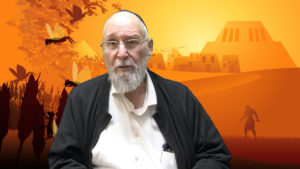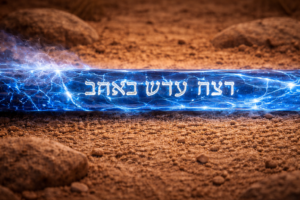- Faith ⬦ Read ⬦ Shabbat ⬦ Weekly Torah Portion
Believe in Yourself! – Parshat Va’eira
Anyone who wants his work to be easy needs to believe in himself. Otherwise, he will have to work hard, both spiritually and physically. The Torah testifies that the reason the Nation of Israel did not listen to the voice of Moses was due to a broken spirit and the hard labor. When someone’s spirit is broken—which results in a lack of faith—then certainly their work is hard. This is the topic of this week’s parsha discussion.
This week’s Torah portion is parshat Va’eira. G-d promised the Jews to take them out of Egypt and bring them to the Land of Israel. Moses told the nation what G-d had said, but the Torah relates that they did not listen to him: “Moses told all this to the Jewish people, but they didn’t listen to Moses because of their broken spirit and the hard labor” (Exodus 6:9).
Rebbe Nachman revealed to us a wonderful secret: every person needs to believe also in himself. We all know that we need to believe in the Creator. Most of us know that we also need to believe in the true tzaddikim. Some of us know that we should believe in the good in our friends, but who talks about “believing in oneself”? And what does “believing in oneself” even mean, and regarding what should a person believe in himself?
In order to understand this, we will bring a wonderful concept that Rebbe Nachman revealed which will help us understand this topic:
“When a person has faith, he can serve the Creator in any way. He doesn’t have to serve him by going to extremes, with “hard labor” or difficult devotions. Our sages taught us: “HaKadosh Baruch Hu doesn’t deal tyrannically with his creations” (Avodah Zara 3a). That is to say that the Creator does not ask from us anything we cannot do. The Creator wants us to live and fulfill His commandments. Concerning all of the Torah’s mitzvot, if a Jew is given the choice of either doing an aveirah (sin) or being killed, he must do the aveirah because the value of life is more important, as it is said: “live by them” (Leviticus 18:5). There are, however, three serious offenses—idolatry, gilui arayot (involvement in forbidden sexual relations such as adultery), and murder—which if a Jew is tested with one of these three transgressions (for example, to betray his faith in the Creator by doing an action which is considered idolatry), he is obliged to give his life and die in order to not commit such a transgression, G-d forbid.
But sometimes a person is required to go to the extreme with mesirut nefesh (giving one’s life) even for a simple mitzvah. This happens in a situation when the goyim make a decree in order to force Am Yisrael to abandon their religion. The Gemara (Sanhedrin 74b) gives an example of this: “Aarkata Damsani“—sandal straps. Rashi explains: “If the Jews are accustomed to tie their shoes in a certain way, while the goyim tied them in a different way, and they specifically try to force him to tie them in the way that the goyim do, then, at a time of an attempted forced conversion, when they are trying to make a Jew abandon his faith, he is required to give his life even for such a simple Jewish custom, just as if it were one of three serious offenses—the prohibition of idolatry. Based on this idea, Rebbe Nachman teaches that going to extremes and mesirut nefesh are required when one’s faith is in danger of being damaged.
The Creator does not ask from us anything we cannot do. The Creator wants us to live and fulfill His commandments!
Rebbe Nachman continues: When the goyim make a decree to try to make the Jews go against their religion, it is considered to be absolute heresy against the Creator. Idolatry is considered a form of death—without a “ruach chaim,” spirit of life—about which the verse says: “neither is there any breath in their mouth” (Psalms 135:17), so that one has to give up his life completely for this. On the other hand, complete faith is called “erech apayim,” long suffering, which is a perfect spirit of life. (“Erech apayim” is one of G-d’s Thirteen Attributes of Mercy, which is the opposite of anger.) Because when a person has perfect faith, there is nothing that can make him angry or cause him to defile his faith. All the storms and difficulties he experiences have no power to move him, because he has the “orach ruach,” patience, to skip over and overcome all obstacles and difficulties he experiences and to serve G-d with ease, with faith in any situation (Likutei Moharan I, 155). We see, then, that a complete lack of faith is considered as “not having a spirit” at all, and complete faith is considered “erech apayim,” meaning “ruach b’shleimut,” a full spirit.
Hence Rebbe Nachman teaches that when a person has faith—but only that his faith is not perfect—it is considered “kotzer ruach,” impatience, which is half-way between idolatry, where he has no “ruach,” no spirit, and “erech apayim,” which is a complete spirit. Therefore, when a person has “kotzer ruach” because his faith is imperfect, he has to serve G-d with “hard work,” with more difficult and extreme devotions. In exactly the same way, a Jew needs to give up his life even for a small matter if it involves denying the Creator, for exactly the same reason, when one’s faith is incomplete, he is required to serve G-d in a more difficult manner than usual.
However, contrary to the prevailing view that lack of faith refers only to those who do not believe in HaKadosh Baruch Hu, Rebbe Nachman teaches that even those who do not believe in themselves are considered as “lacking in faith.” Rebbe Nachman thus interprets the words of the Gemara on the verse: “Who plunders the day of small things?” (Zechariah 4:10). Our sages explained of this verse: “What caused the table [i.e., the reward] of the talmidei chachamim to be plundered in the World to Come? It was their small-mindedness” (Sotah 48b). Rebbe Nachman explains that the meaning is that they lacked faith in themselves, that they did not believe in themselves (Likutei Moharan II, 86).
What does “believing in ourselves” mean? Rabbi Natan related: “When Rebbe Nachman revealed this Torah, I stood before him astonished and thought to myself: ‘What is he trying to tell me, that I am lacking in faith and that is why I have to put so much effort into serving G-d? Surely, I do not belong to the category of those who do not believe. So, what is he trying to tell me with this lesson?’ Rebbe Nachman then rebuked me: ‘Even if you believe, you still have no faith in yourself!’” (Sichot HaRan 140).
Rabbi Natan explains his words clearly and pleasantly: “Belief in ourselves means that we believe we are important in G-d’s eyes, that our actions have value, and that G-d, out of His goodness, desires our service. Yes, it does interest him whether we do good or, G-d forbid, not. This is not as some people say to themselves, ‘I’m just a simple person. What difference would it make, what will be gained or lost, if I don’t behave as I should.’ The answer is that it definitely will make a difference. Every Jew has a very lofty soul, and every one of his deeds is very significant to G-d. The more a person believes in himself, the more he will weigh his deeds and act accordingly. This basically means that the main reason we are not as we should or want to be is because we lack faith in ourselves.
Rabbi Natan adds that a lack of faith in ourselves also harms our “faith in the sages” and this leads to a lack of faith in the Creator. He explains this in a true-life parable: “If a person believes in HaKadosh Baruch Hu and believes in the tzaddikim, and also believes in his good friends, but only he says to himself, ‘The tzaddikim are surely wonderful people and this is how it should be. My friends are also wonderful and tzaddikim, and they are something special. But I…I am not on that level. I have no connection to all that. The tzaddikim are never going to be able to help me. They have no chance of changing me for the better. The way I am is the way I shall remain.’” Rabbi Natan explains: “This is the greatest lack of faith in the sages, when a person supposedly believes in the tzaddik, but he does not believe that the tzaddik has the power to help him, because he does not believe in himself that he has the ability to change. This is the greatest lack of faith in the sages and therefore also a lack of faith in HaKadosh Baruch Hu.”

Belief in ourselves means that we believe we are important in G-d’s eyes!
Concerning this, Rabbi Natan brings an example from Adam HaRishon. We are discussing a case, “faith in the sages” that can be interpreted in several ways, one of which is believing in the true sages. Adam HaRishon, however, was created alone. So, how could the expression “faith in the sages” have applied to him? Who was there that he could have had faith in? It is clear that the intention was that he needed to believe in himself, which is that aspect of having faith in the sages. If Adam HaRishon had appreciated his own importance and believed that the entire world was depending on him and that every move that he made was important and significant, he would never have been tempted to eat from the Tree of Knowledge.
But what about humility? How do we equate all this to the many teachings that a person is supposed to be humble and lowly? To this Rebbe Nachman replied: “Humility does not mean being a good-for-nothing.” As he defined it: “One doesn’t need to be a total failure or depressed or derided. Not at all. There is no contradiction between recognizing one’s own value and being humble, which is an expression of self-negation before the Creator. This is the true humility, a humility that brings joy in its wake.” This is the humility of Moses who had an unrivaled leadership ability. And yet, he was a most humble person, as the Torah testifies about him: “And Moses was the most humble person in the world” (Numbers 12:3). Therefore, Rebbe Nachman teaches that it is not possible to reach such a true level of humility without prayer, because when a person is trying to improve himself, it is very difficult to subdue selfishness and pride, and when a person does try to subdue his pride, he can very quickly fall into a mindset of restricted consciousness and worthlessness, which is certainly not true humility (Likutei Moharan II 22:72).
Anyone who conducts himself with a sense of “kotzer ruach,” impatience, idleness, or lack of faith in oneself, will find it very difficult to serve G-d easily. This is what the Torah testifies: and they did not listen to Moses, “due to the kotzer ruach and avodah kasha—due to their impatience and the hard work,” because one thing depends on the other, as we have said. When we merit to believe in ourselves, then we will merit to “erech apayim,” being slow to anger, and thereby we will come to believe in the sages and listen to Moses’ words and to complete faith in the Creator.
(Based on Likutei Halachot, Pikadon 5:7)
- Adam HaRishonavodat HashemDvar Torahemunaherech apayimfaithfaith in ourselvesfaith in the sagesfeaturedforbidden sexual relationsgilui arayothumilityidol worshipIdolatryJewish spiritualityjoykotzer ruachleaving EgyptLikutey HalachotLikutey MoharanMoshe RabbeinumurderNation of IsraelprayerprideReb NosonRebbe Nachmanself-negationThirteen Attributes of MercyTorah’s commandmentsTzaddikimWeekly Torah Portion
- 0 comment






















